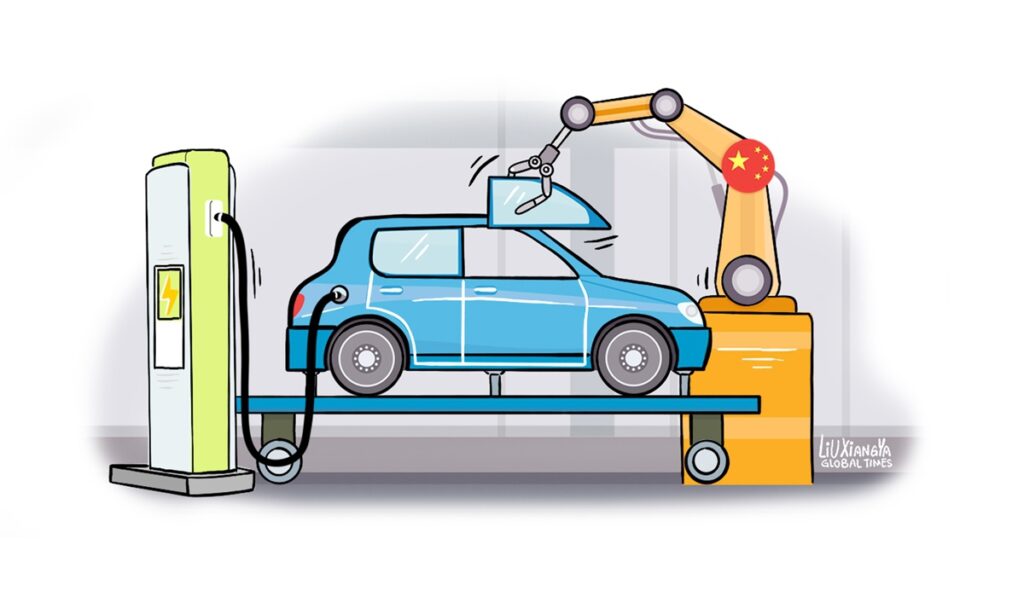It’s no secret that some US political elites have hoped that Mexico would align itself with Washington’s actions against China. In the latest example, Elissa Slotkin, a representative from Michigan, and Sherrod Brown, a senator from Ohio led a group of nearly two dozen members of the US House and Senate in a letter to Mexico’s new President Claudia Sheinbaum, urging her to address the so-called “national security threat” posed by advanced vehicles related to China.
The letter came after the US Bureau of Industry and Security announced in September a notice of proposed rulemaking to “prohibit the sale or import of connected vehicles integrating specific pieces of hardware and software … with a sufficient nexus to” China or Russia. The proposed rule reflects Washington’s abuse of national security in its dealings with the Chinese economy.
In recent years, the US has generalized the national security concept to suppress and discredit made-in-China products. This seems to have become an endless political farce, with its latest targets seeming to be China’s new-energy industries like connected vehicles.
However, coming as some US political elites intensify efforts to fabricate and spread the “national security threat” supposedly posed by advanced vehicles, the Mexican economy may suffer losses, given the importance of the auto sector to the economy.
Mexico is the world’s seventh-largest passenger vehicle manufacturer, producing 3.5 million vehicles annually. The auto sector is one of Mexico’s most significant industries, comprising 3.6 percent of the nation’s GDP, 18 percent of the manufacturing sector, and employing more than 1 million people nationwide, according to the US International Trade Administration (ITA).
The United States-Mexico-Canada Agreement (USMCA), which went into effect in July 2020, requires that 75 percent of a vehicle’s content (70 percent for heavy trucks) be produced in North America, in order for automobiles to qualify for preferential, duty-free treatment. Mexico has always been an ideal investment destination for global automakers because average wages in the country are significantly lower than those in the US and Canada.
Mexico’s auto industry is booming, attracting major players from all over the world. The potential for economic cooperation between China and Mexico in the fields of vehicle manufacturing and supply chain investment is vast, and Chinese companies obviously still value the Mexican market.
The recent decade has witnessed the rise of China’s electric vehicle (EV) industry. The country has become an important source of outward investment in global EV supply chains. Chinese companies have maintained a competitive advantage in the fields of core technologies and core components such as lithium-ion batteries. As a result, Chinese companies are ideal partners for the development of EV manufacturing in Mexico.
If the “national security” fallacies spread by US political elites undermine the complementarity of cooperation, it will be Mexico’s economy that will ultimately suffer.
Mexico and the US share a highly integrated economic relationship. At least 88 percent of vehicles produced in Mexico are exported, with 76 percent destined for the US, according to the ITA. Internal and external economic policies adopted by Mexico are constrained by an excessive dependence on the US market.
Investment by Chinese enterprises in Mexico’s auto industry, especially the EV supply chain, represents complementary cooperation in advanced production capacity. The Mexican EV market has been growing. Some analysts believe that the country has solidified its position as a crucial force in the future of EVs, but Mexico still has a long way to go to establish a complete EV supply chain.
The nature of China-Mexico economic and trade cooperation is mutually beneficial. If US politicians continue to place pressure on Mexico and try to undermine normal economic cooperation, it will certainly harm Mexico’s economic potential.
